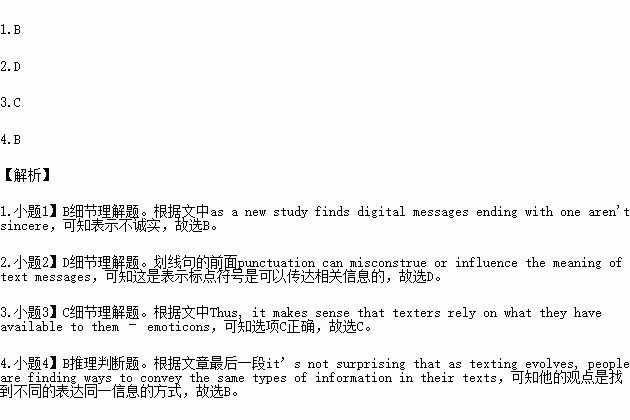题目内容
A full stop is used at the end of an idea or thought, and is an important rule in proper grammar. But text messages are changing the rules, as a new study finds digital messages ending with one aren't sincere. The results suggest skipping punctuation altogether, as it indicates you are answering naturally and heartfelt.
Binghamton University’s Harpur College observed 126 students, who read a series of messages displayed as texts on a screen or handwritten notes on loose-leaf paper(活页纸). In the 16 experimental exchanges, the sender’s message contained a statement followed by an invitation phrased as a question such as, “Dave gave me his extra ticket. Wanna come?” The receiver then gave a one-word response like “Okay”, “Sure”, “Yeah” or “Yup”. Half of the participants’ responses were with a full stop and the other half did not use it. Based on the responses, text messages that ended with a full stop were rated less sincere than those that did not end with one. The students who read the notes on the paper reported that full stop or not, they felt the message was sincere. These results suggest that punctuation can misconstrue or influence the meaning of text messages. The study concludes, “ not so much that the full stop is used to convey a lack of sincerity in text messages, but that punctuation is one of the cues(提示) used by senders, and understood by receivers, to convey practical and social information. ”
“Texting is lacking many of the social cues used in actual face-to-face conversations”, said Celia Klin, associate professor of psychology at Binghamton University’s Harpur College. “When speaking, people easily convey social and emotional information with eye gaze, facial expressions, tone of voice, pauses, and so on. People obviously can't use these mechanisms when they are texting. Thus, it makes sense that texters rely on what they have available to them -- emoticons, deliberate misspellings that mimic speech sounds(拟声) and, according to our data, punctuation. ”
Recently, Klin’s team conducted a follow-up study and found that text response with an exclamation mark(感叹号) is interpreted as more sincere. “That’s not surprising, but it broadens our claim,”saidKlin. “Punctuation is used and understood by texters to convey emotions and other social and practical information. Given that people are wonderfully good at communicating complex information in conversations, it’s not surprising that as texting evolves, people are finding ways to convey the same types of information in their texts. ”
1.According to a new study in the first paragraph, digital messages with punctuation indicate you are ______.
A. impolite B. insincere C. heartfelt D. natural
2.The underlined sentence in the passage means that ______.
A. the full stop conveys a lack of sincerity in text messages
B. to show sincerity, people shouldn’t use punctuation in text messages
C. punctuation can’t influence the meaning of text messages
D. punctuation actually conveys practical and social information in a way
3.Compared with face-to-face conversations, which of the following can text messages rely on to convey their meaning?
A. Eye contact B. Tone of voice C. Emoticons D. Gestures
4. Which of the following agrees with Celia Klin’s opinion?
A. Conversations rely on the same expression way as text messages.
B. Texters may find more ways available to convey the same information.
C. Text response with an exclamation mark sounds more insincere.
D. Punctuation is only used to convey emotions.
 捷径训练检测卷系列答案
捷径训练检测卷系列答案 小夫子全能检测系列答案
小夫子全能检测系列答案
